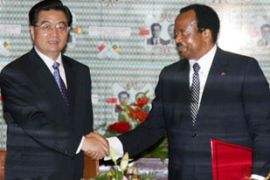China offers Cameroon $100m in aid
Hu offers aid and discusses a role for China in Cameroon’s oil sector.

Published On 1 Feb 2007
Hu, the first Chinese head of state to visit Cameroon, also agreed to build two schools and a hospital in the country’s commercial capital Douala, and discussed social aid programmes for clean drinking water and cheap housing.
“China and Africa have never tried to impose their social and economic development models on others,” he said in a speech broadcast over state radio and television.
Hu’s pledge includes a $5.15 m grant and a $3.86 m interest-free loan for economic and technical co-operation, as well as two low-interest loans of $45.02 m each, one of them for telecommunications projects.
China has been offering low-interest loans, debt relief and other incentives in Africa.
The world’s poorest continent is fast-becoming a major supplier of oil and raw materials to China which needs vast quantities to feed its booming economy.
At a summit in Beijing in November, Hu offered Africa $5 bn in loans and credit, and promised to double aid.
Big investments
Biya called for more Chinese investment in his country.
“Through you, I invite Chinese companies to come and invest in Cameroon, especially in hydrocarbons such as gas and oil, mineral exploitation and forestry where numerous opportunities exist,” he said to Hu.
China’s trade with Cameroon – rich in oil, bauxite and iron ore – doubled to $338 m in the first 11 months of 2006.
Biya told Hu that Cameroon had become “one of the best risks in Africa” after receiving debt relief under the World Bank’s Heavily Indebted Poor Countries initiative.
Hu and his team, which includes Bo Xilai, the commerce minister, and Li Zhaoxing, the foreign minister, are expected to strike more deals in Liberia, Sudan, Namibia, South Africa, Seychelles, Zambia and Mozambique.
Trade between China and Africa jumped 40 per cent to $56 bn last year, with the balance of trade $2.1 bn in Africa’s favour, according to Chinese Trade Ministry data published this week by China’s news agency Xinhua.
But some Africans fear that poor African countries would ultimately lose from expanding trade with China unless they carefully examine bilateral deals and protect their weak manufacturing sectors from cheap Chinese clothes and household goods.
Some Western leaders and analysts have criticised China for offering trade, aid and investment with no strings attached, saying it undermined efforts by some Western donors to promote democracy and human rights through conditional aid.
Hu’s trip will also take him to Sudan, where civil war in the western Darfur region has killed an estimated 200,000 people and forced 2.5 million more from their homes.
China has resisted sanctions and other pressure on Sudan, from which it buys oil, saying they will not help to solve the conflict in Darfur.
Source: News Agencies